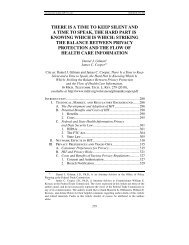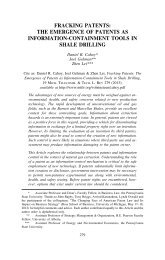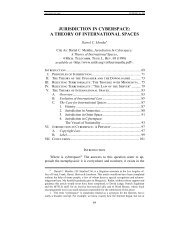the chinese regulatory licensing regime for pharmaceutical products
the chinese regulatory licensing regime for pharmaceutical products
the chinese regulatory licensing regime for pharmaceutical products
Create successful ePaper yourself
Turn your PDF publications into a flip-book with our unique Google optimized e-Paper software.
436 Michigan Telecommunications and Technology Law Review [Vol. 15:417<br />
to encourage <strong>the</strong> supply of drugs to poor and remote areas. However, this<br />
entry standard relaxation is probably not <strong>the</strong> best solution to creamskimming<br />
because it involves o<strong>the</strong>r costs. For example, poorly educated<br />
pharmacy workers may lead to great risks to consumers’ health. Alternative<br />
solutions, including publicly financed subsidies, may better address<br />
<strong>the</strong> cream-skimming problem. 113<br />
Ano<strong>the</strong>r concern is that <strong>the</strong> reasonable location standard may be<br />
used to reject applications. According to an official opinion of <strong>the</strong><br />
SFDA:<br />
At present, <strong>the</strong>re are many drug traders that are organized in<br />
small sizes and unreasonable structures. It is one of <strong>the</strong> major<br />
problems which may hinder good development of <strong>the</strong> medical<br />
economy . . . <strong>the</strong>re<strong>for</strong>e, it is crucial to apply <strong>the</strong> reasonable location<br />
standard to evaluate every application <strong>for</strong> a drug trader’s<br />
license . . . . [A]ll branches of <strong>the</strong> SFDA should . . . encourage<br />
drug traders to become larger and exclude disadvantaged traders<br />
from <strong>the</strong> market. 114<br />
This official opinion is not always clear, particularly regarding such<br />
terms as “unreasonable structure” and “disadvantaged traders”; however,<br />
it does indicate that <strong>the</strong> SFDA does not favor too many traders, especially<br />
if <strong>the</strong>y are small in size.<br />
Here is an example <strong>for</strong> fur<strong>the</strong>r contemplation of <strong>the</strong> reasonable location<br />
standard: suppose that a branch of <strong>the</strong> SFDA concludes that a<br />
particular community only needs two pharmacies after considering its<br />
population, transport conditions, and real demand <strong>for</strong> drugs; it issues two<br />
retailer’s licenses in this community. Should it grant more retailer’s licenses<br />
to small traders in this community If <strong>the</strong> answer is no, we will<br />
have to consider any negative effects caused by this direct numerical<br />
limitation. The costs of limiting competition are not trivial, especially<br />
when small drug retailers are very flexible in meeting consumer demand.<br />
115 The more significant question is whe<strong>the</strong>r <strong>the</strong> branch of <strong>the</strong><br />
SFDA has sufficient in<strong>for</strong>mation and expertise to choose <strong>the</strong> numerical<br />
limitation. From this aspect, free market <strong>for</strong>ces often provide a better<br />
solution than a <strong>licensing</strong> authority.<br />
113. 2 Alfred E. Kahn, The Economics of Regulation: Principles and Institutions<br />
235 (1971).<br />
114. State Food & Drug Admin., A Notice Concerning Several Problems in Implementing<br />
<strong>the</strong> Regulation of Drug Traders’ Licenses (Apr. 29, 2004) (P.R.C.), available at<br />
http://www.sfda.gov.cn/WS01/CL0055/10115.html.<br />
115. Lingzhi Zhu, The Future of Community Pharmacy After Deregulating <strong>the</strong> Retail<br />
Market, http://health.sohu.com/20071128/n253659975.shtml (last visited June 14, 2009).






